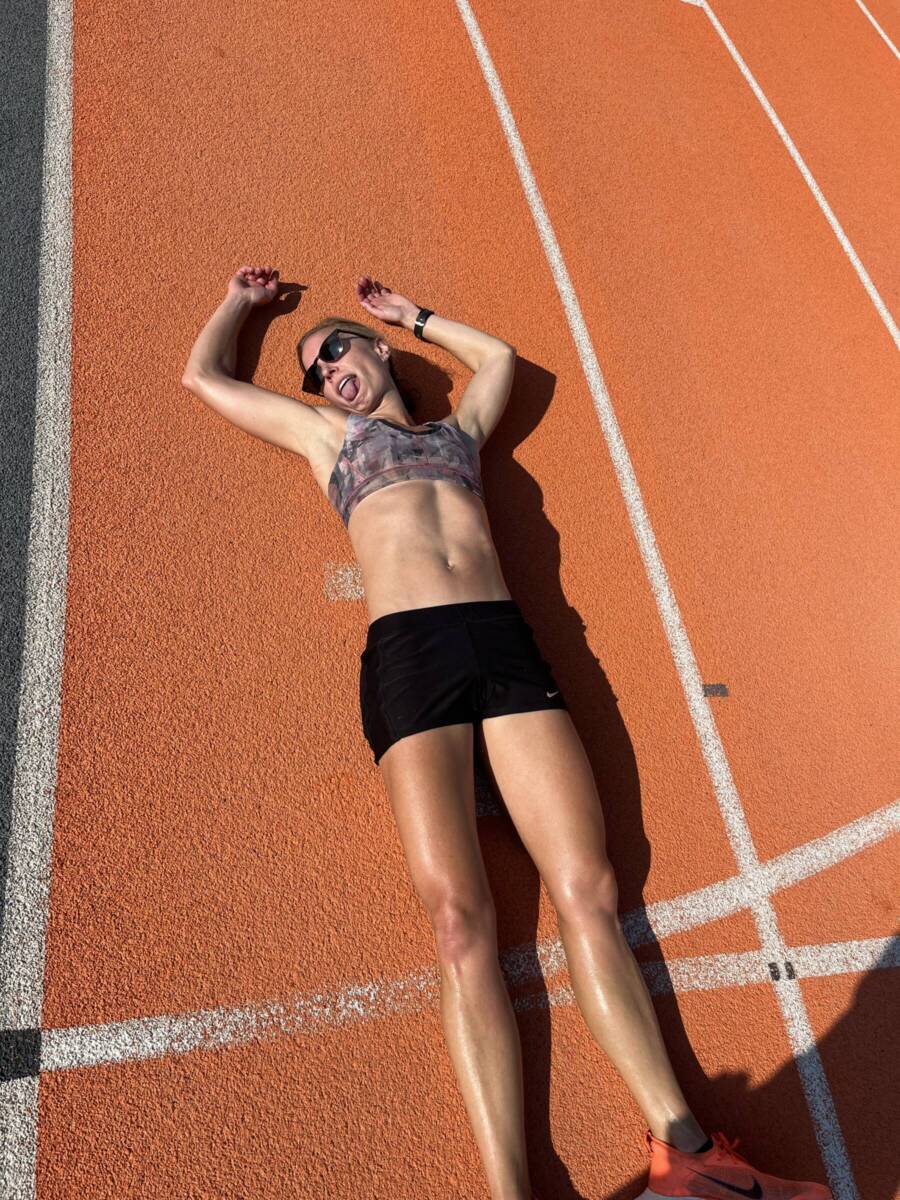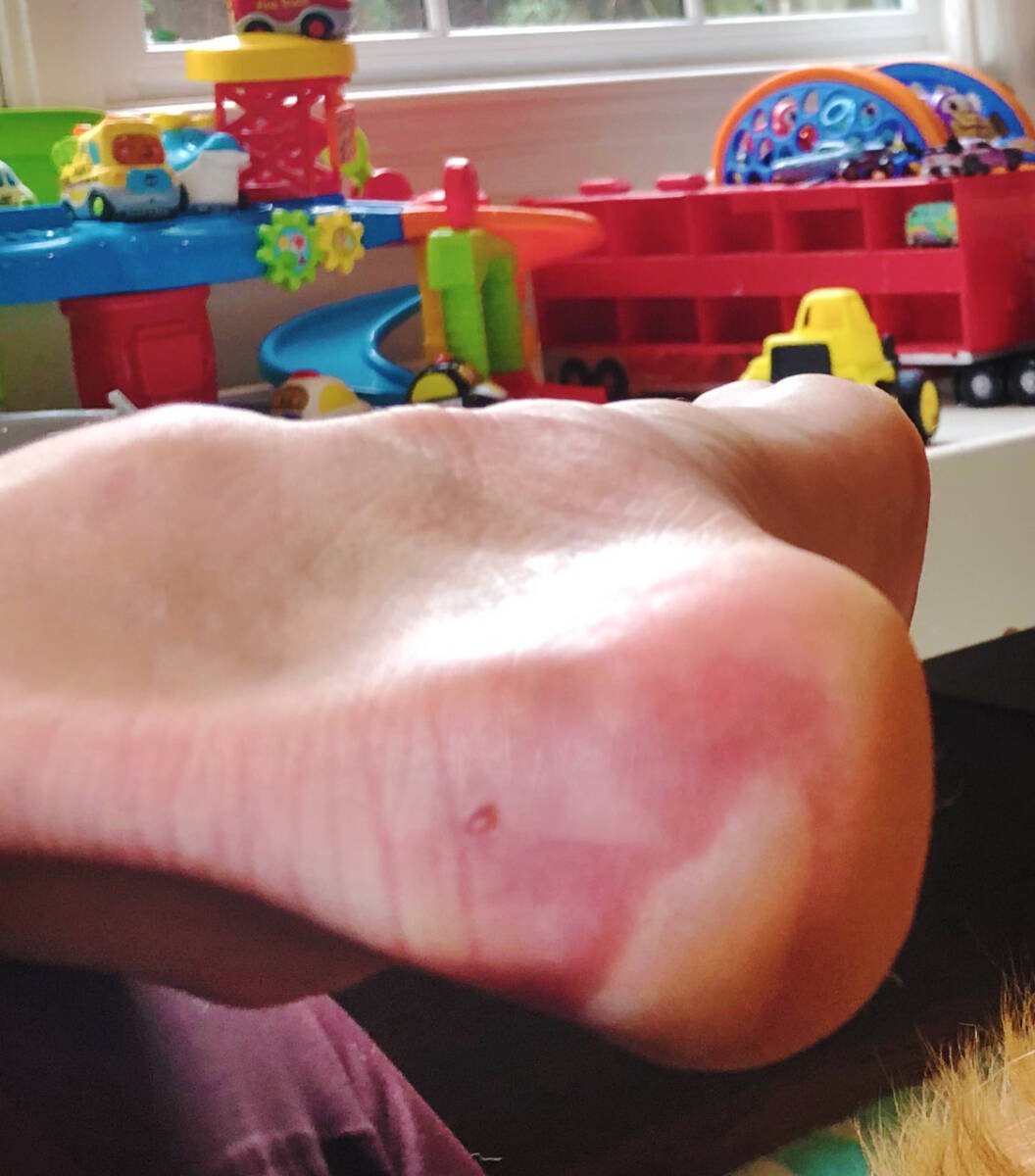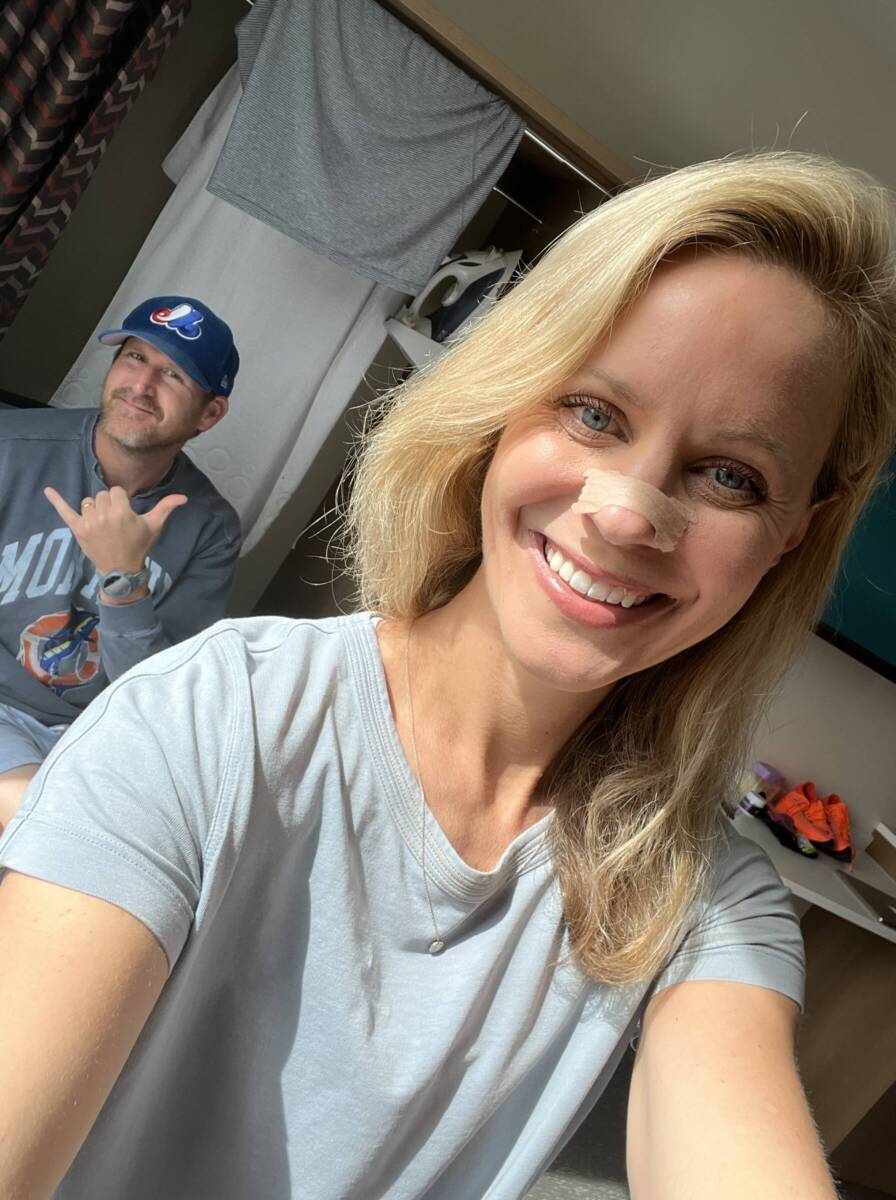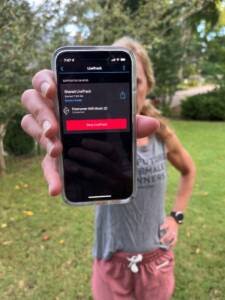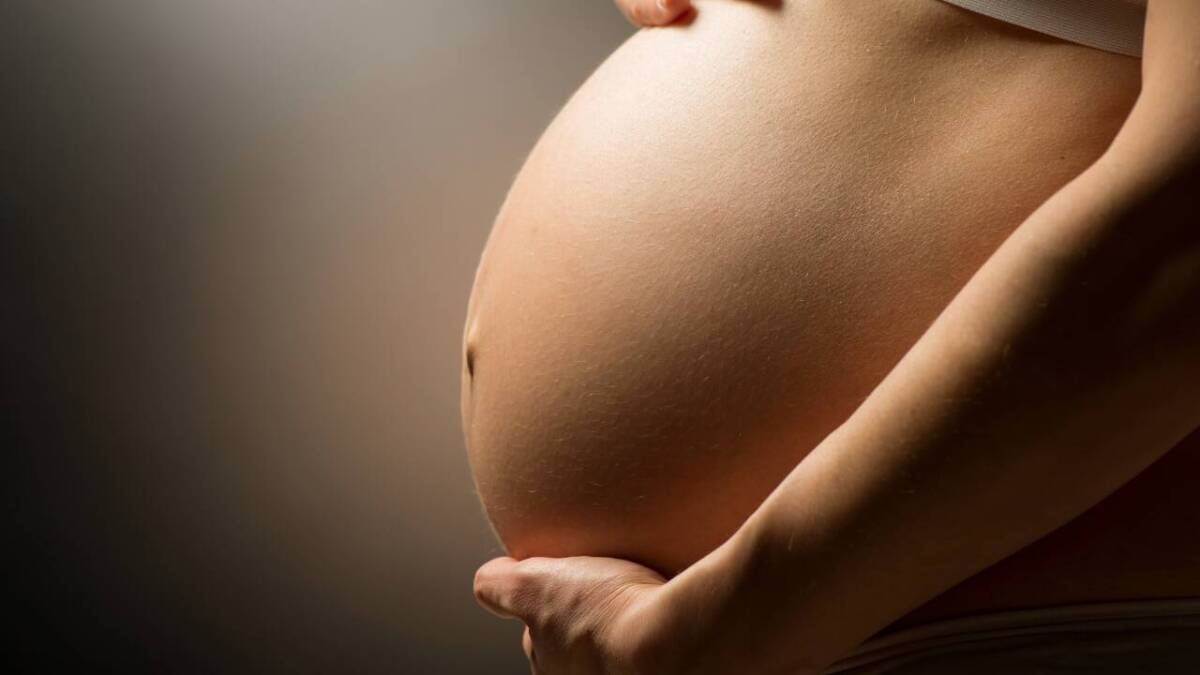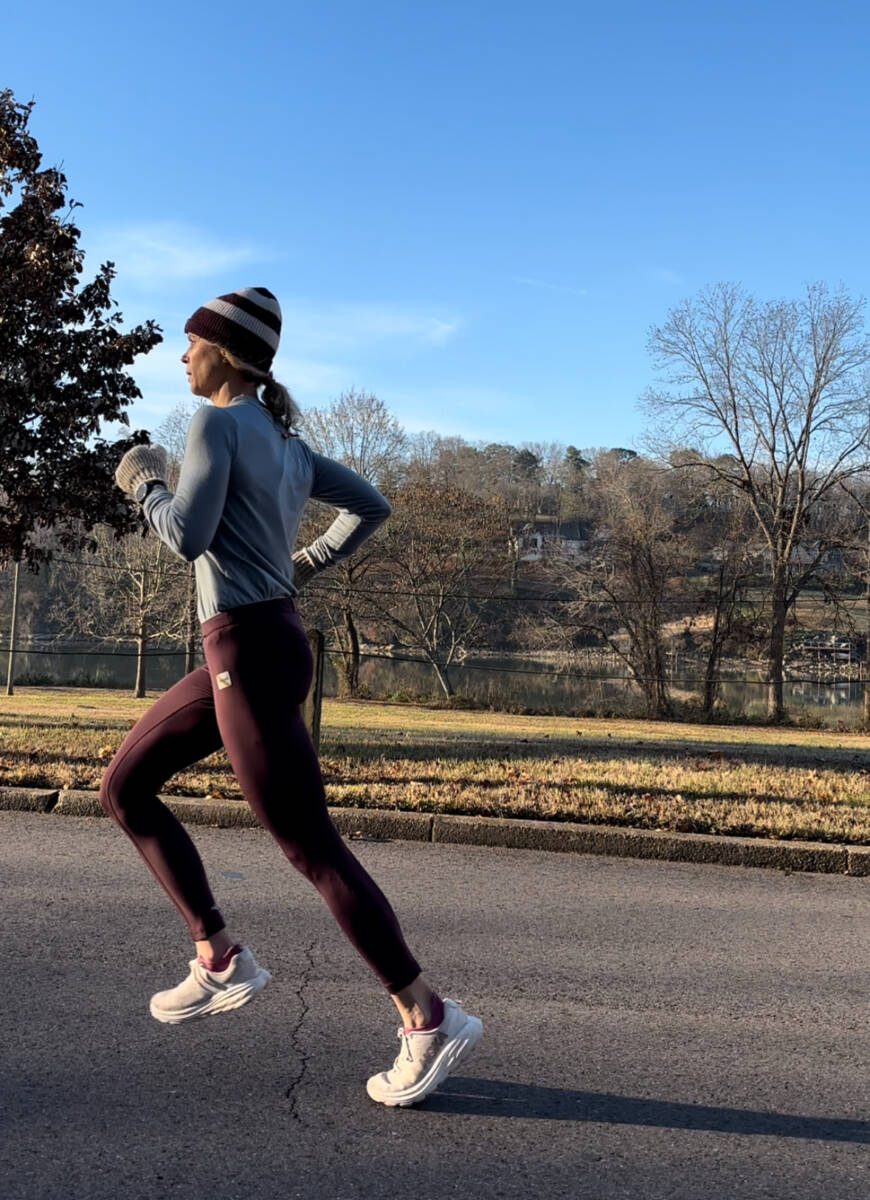The 6 Best Recovery Shoes for Runners
Research supports that fatigue is reduced and runners experience faster recovery when they wear a good recovery shoe. I think every runner should own a good pair of recovery shoes. Below are the top 6 recovery shoes for runners–ranging from slides to shoes to slippers. My absolute favorite are the Oofos flip flops which help my feet and legs feel markedly better after a long run. Read my full review below!
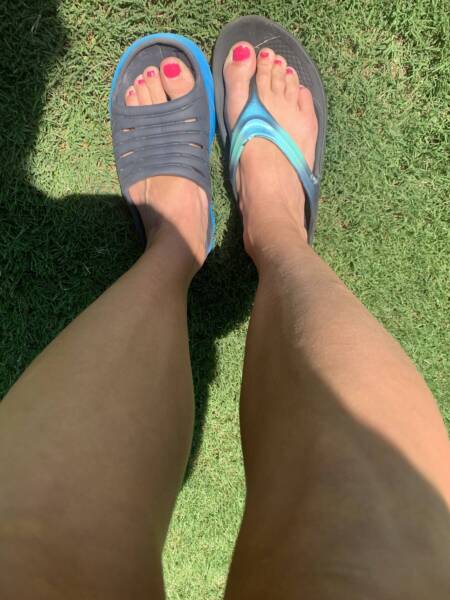
Table of contents
As a master’s runner and injury-prone runner, I need to recover as hard as I train. And one key aspect of recovery I’ve discovered is wearing recovery slides for runners. You know, key aspect isn’t the right term—game-changer is better.
I started wearing a pair of recovery sandals after I tore my plantar fascia in the summer of 2021. The recovery slides were the only shoes I could walk in. I am being totally literal here. It still hurt to walk but it was much better than even wearing my running shoes or carbon fiber racing shoes.
I became attached to my OOFOs but wanted to know what the best recovery slides were. As you know, I don’t do anything half way so I ordered 2 of the other most popular options for recovery sandals and shoes and wore each religiously for a week. From my experience, I created this full review of my 6 top picks for recovery shoes and slides. In addition to my experience, I gathered feedback from fellow runners and scoured product pages and online reviews.
But first: I always recommend checking with your doctor or physical therapist before changing foot wear or treating an injury. This post should not be taken as medical advice; always consult your medical care provider for any issues regarding your health.
6 Best Recovery Shoes for Runners
1. OOFOs Ooriginal Sandal — $60
We are starting with the mother of recovery sandals, the OOFOs sandals. These sandals are proven to ramp up your recovery so that you can bounce back and nail your next run. They have proprietary OOfoam™ technology that absorbs 37 percent more impact and reduces ankle energy exertion by almost 50 percent than traditional foam footwear materials and competitors.
Indeed, if you compare them to other comfort sandals like Crocs you will feel that the foam is much more cushioned without compromising arch support. Unlike the rigid material of Crocs that can tire muscles, OOFOs reduce the stress on your knees, ankles, and joints. OOFOs are also a great pick for those suffering from plantar fasciitis. They have a footbed that cradles and supports your arch. As noted, I became reliant on my OOFOs when I had intense foot pain from plantar fasciitis and a plantar fascia tear. When I began running again, I continued to wear my OOFOs sandals to keep my plantar fasciitis from flaring. Eventually, I noticed how much better my legs felt post-run and transitioned to wearing them consistently, regardless of plantar fasciitis pain.
OOFOs sandals have the ultimate cushion and shock absorption. They feel bouncy yet supportive and the footbed is soft. Indeed, I have never worn a more comfortable shoe.
Even with all of these benefits, they aren’t perfect. OOFOs has new designs that are more attractive than the sandals in my opinion (like the OOahh OOFos recovery slides or the OOmg EeZee Low Shoe)—but they still aren’t pretty (aka not suitable yet for weddings!). And when they wear down, the sole will become flimsy and fold under putting you at risk for falling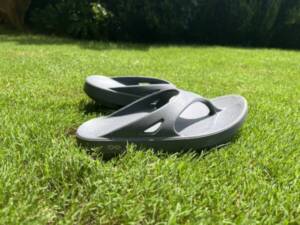
Pros of OOFOs:
- Optimal blend of plush cushioning and stability
- American Podiatric Medical Association (AMPA)-approved
- No rubbing or chaffing of straps
- Incredibly comfortable and easy to put on
- Easily rinsed off if they get dirty
- Perfect for those who suffer from plantar fasciitis
- Last up to a year of regular use
- Don’t get sweaty or hot
- Scientifically proven to increase recovery
Cons of OOFOs:
- Not attractive
- The color coating can peel off the colorful models
- The foam on the sole can get flimsy and fold underfoot
OOFOs Original Sandal Specs:
- Type: Flip-flops
- Color: Comes in various colors
- Weight: 4 oz.
- Drop: NA
Note: If you aren’t into flip flops, the OOFOs recovery slides are also a fantastic recovery sandal for runners.
2. Hoka ORA Recovery Slide — $60
Seeking recovery slides for runners? Check out this option from Hoka, another shoe I became reliant on when I had my plantar injury. I realized the hard way that Hokas shoes are the only running shoes I can log high mileage in and stay injury-free. 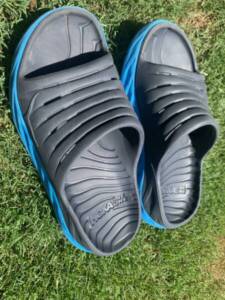
My amazing experience with Hokas made me excited to try their recovery slides as a my post-run recovery shoe. As expected, I loved the feel of the Hoka ORA Recovery Slides. They are shoes like OOFOs; they fit my feet like a glove, making them feel extra supported, and the slides even have a somewhat similar appearance to the OOFOs ones.
The Hoka signature meta-rocker helped propel my feet forward requiring my legs to use less energy to move. Wearing the Hoka shoe slides after my runs made my legs feel less worked but not as recovered compared to my OOFOs sandals. I think it is because the material in the Hoka recovery slides is more rigid so each step, while supported, wasn’t as springy or bouncy.
What I loved most about the Hoka vs. OOFOs recovery sandals was that they held my feet in place. I felt more supported to do things like walk my energetic dogs without tripping or sliding.
Pros of Hoka ORA Recovery Slides:
- Wide footbay
- Foot-cradling comfort with optimal support
- Supportive sole with Good arch support
- Various colors
- Easy to clean
- Doesn’t get hot
- Makes your legs feel less worked
- Comes in a sandal option
- The material lasts longer than a year
- Less expensive than OOFOs
Cons of Hoka ORA Recovery Slides:
- Not as cushioned or as soft of a sole as OOFOs
- Looks like an athletic shoe so doesn’t go with “street clothes”
Hoka ORA Recovery Slides Specs:
- Type: Slide sandals
- Color: Various colors and two patterns
- Weight: 6.6 oz.
- Drop: 6mm
Note: If you are more interested in the flip-flop design Hoka, now has recovery flip-flops. They have the same rocker and anatomically-friendly fit but improved toe straps to eliminate chafing and discomfort.
3. Kane Revive Active Recovery Shoe — $75
If the Hoka slides are good for walking the dog, then Kane’s Revive Active Recovery Shoe is great for jogging with your dog. Indeed, these closed-toed shoes are “active recovery” shoes, meaning they are meant for you to be up and moving around versus lounging or leisurely walking.
For this reason, these recovery slip-on shoes are not recovery sandals or slides. They fit around your whole foot and resemble Crocs—but with an edgier and cooler design (though my kids who love their Crocs and their Jibbitz charms may disagree).
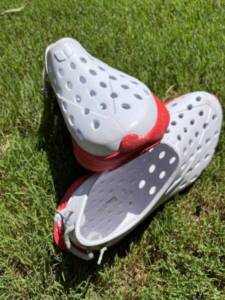
I loved that my feet felt supported and massaged in these shoes. The footbeds have rubber nodes that massage pressure points in your foot, activating blood flow according to the Kane website.
I didn’t love how rigid the material felt or the way the cut rubbed into the side of my foot giving me a mild blister. I have not heard other people complain of this so it is likely just my foot anatomy! For this reason, I wore these shoes for walks with my dogs and errands like to the mall with my kids, but I didn’t wear them around the house like I did with the OOFOs and Hokas.
Pros of the Kane Revive Active Recovery Shoe:
-
-
- 10mm heel-to-toe drop that reduces strain on the Achilles and assists natural stride
- A wide toe box to accommodate for post-workout swelling
- Excellent arch support, great for plantar fasciitis
- Raised nodes on the sole to stimulate blood flow and massage feet
- Stays put so you can be active
- Easy to rinse and clean
- An array of attractive colors and styles
- Made of eco-friendly material and 100 percent recyclable
-
-
Cons of Kane Recovery Shoes
- Rigid material that needs to be worn in for comfort
- Can get hot and sweaty
- Can rub at ankle
Kane Revive Active Recovery Shoe Specs:
- Type: Slip-on
- Color: Various colors and patterns
- Weight: about 9 oz.
- Drop: 10 mm
4. PR Soles Sconset Recovery Flip Flops — $40
If you want a recovery shoe that massages your feet as you walk, and doesn’t cost a lot of money—then the PR Soles flip flops are for you. The PR Soles recovery shoes are designed by runners (Gone for a Run) for runners. They feature the patented Acupoint massaging footbed with massaging nodules on the insole to help reduce pain and recovery time, and promote blood flow. The trigger points help break up lactic and uric acid in your feet and the cushioned foam is soft underfoot, lightweight, and durable for the money.
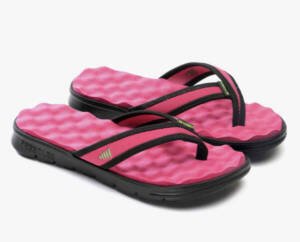
Pros of the PR Soles Sconset Recovery Flip Flops:
- Massage nubs stimulate blood flow
- Durable and light weight
- Various colors
- Non-slip
- 30-day return
Cons of the PR Soles Sconset Recovery Flip Flops:
-
-
- Runs small
- Massage bumps could hit feet wrong and actually hurt
- Some users said showed signs of wear after 6o days
- Design helps feet recover, but not legs
-
PR Soles Sconset Recovery Flip Flops Specs:
-
-
- Type: Flip-flops
- Color: Comes in various colors
- Drop: NA
-
5. Hoka Bondi 8 – $165
Yes, the Hoka Bondi is a running shoe but it is also one of the, if not THE, most cushioned running shoe out there. And for that, it can qualify as a recovery shoe.
In fact, that is how I wore my Hoka Bondis. While many people LOVE the Bondis for running, especially long runs, they felt cumbersome and clunky on my feet. So, I relegated them to recovery shoes. And they make for great recovery shoes!
I wore them after long runs and hard ones, and on easy shakeouts and they made my feet and legs feel oh so good. The Bondis are perfect for active recovery (light exercise that gets the blood flowing to the legs and feet) such as walks and easy runs.
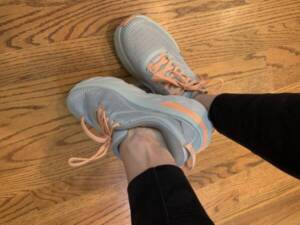
What makes the Hoka Bondi one of the most comfortable shoes is it offers maximum cushion with a thick sole that absorbs impact, stability, neutral yet firm and wide sole, 4mm heel drop that limits stress on your plantar fascia, heel counter that cradles your foot, further limiting stress to the plantar fascia, Hoka’s signature metarocker that helps with heel-to-toe propulsion, and a roomy wide base for natural foot placement.
If you run in your Bondis and then wear them as recovery shoes, be sure to keep track of your mileage!
(Read my full review of the Hoka Bondi here).
Pros of the Hoka Bondi 8:
-
-
- Great support for a neutral shoe
- Maximum cushion with ultra-soft memory foam
- Signature meta-rocker technology for optimal propulsion
- Wide base for stability
- Internal heel counter cradles foot
-
Cons of the Hoka Bondi 8:
-
-
- Narrow midfoot
- Heavy and clunky
- Not an easy slip-on
- No as cushy as some of the flip flips and slides
- Pricy
-
Hoka Bondi 8 Specs:
-
-
- Type: running shoe
- Width: Comes in various widths
- Weight: 10.7 oz.
- Drop: 4mm
-
6. Topo Athletic Revive Recovery Shoes — $120
If you’re wanting a soft slipper to wear around the house that also aids in recovery, then the Topo Athletic Revive Recovery Shoes are your shoes. They are fuzzy slippers that with a sole designed for active recovery. No need to fuzzy socks, slip these puppies on and then feel the 3D wave sense gently massage your feet as you walk around the house—or our and about. The sole is a Vibram tech so it has grippers for outdoor walking as well.
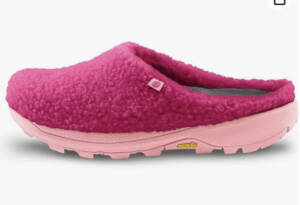
But wearers I surveyed loved putting these on after a long run and then doing chores around the house—felt like a multi-tasking spa day. Some even said it helped with arthritis of the foot. The low drop also allows for natural foot placement which can aid in recovery—less added stress on the muscles.
Pros of the Topo Athletic Revive Recovery Shoes:
-
-
- Fuzzy and cozy
- Underfoot aids in recovery of feet
- Massaging
- Washable
- Vibram outsole
- Wide toe box and natural drop
-
Cons of the Topo Athletic Revive Recovery Shoes:
-
-
- Insole is not fuzzy. But you can buy fuzzy insoles if that’s what you like.
- Expensive
-
Topo Athletic Revive Recovery Shoes Specs:
-
-
- Type: Slipper
- Color: Comes in three colors
- Weight: NA
- Drop: 3mm
-
More advice on recovery shoes for runners
Do recovery shoes really work?
Yes, many recovery shoes do help you recover faster from your runs. I know this firsthand from my experience, my friends’ experiences, and my athletes. Research backs this up. According to OOFOs, a 2018 study by the University of Virginia School of Medicine Speed Clinic found that the recovery sandal OOFOS absorbed 37 percent more impact than traditional foam footwear materials and required 47 percent less of energy exertion,
I have found that a good recovery sandal cuts my recovery time in half after spending long hours on my feet running. My legs feel fresher the next day when I wear my recovery sandals after my long run. They are the perfect tool to add to your passive recovery alongside an ice bath, foam rolling, stretching, and a massage gun.
If you are in a situation where you need to wear a more stylish shoe, I recommend wearing at least a stylish athletic shoe like these trendy shoes under $100.
How long do OOFOS shoes (or any recovery shoe) last?
The more you wear any of these sandals or shoes – and if you are like me, you will want to wear them all the time! – the sooner you will need to replace them. OOFOs reports that their customers get new sandals every 8-9 months, though they recommend replacing the as often as you replace your running shoes if you are wearing them regularly (source).
I refreshed my OOFOs exactly one year after purchasing my first pair because the foam started to get so flimsy that it would fold underfoot, causing me to trip. If you don’t like the idea of investing in a recovery shoe, I still urge you to wear supportive footwear more often than not. You can wear old running shoes or check out these running shoes under 100.
Alright, I think you have what you need to level up your recovery with the right recovery shoe for you! Which one looks the best?

